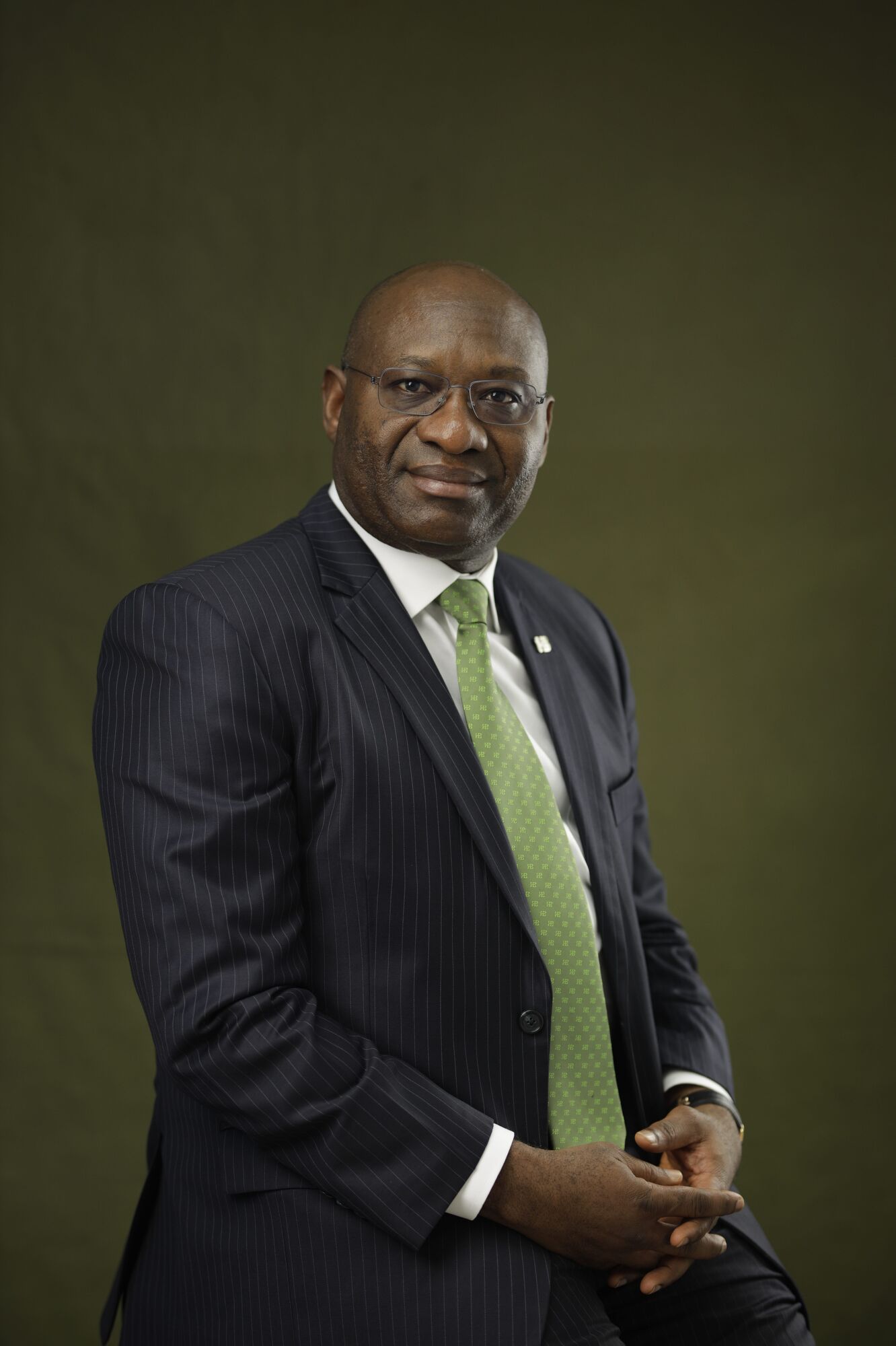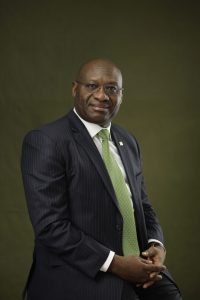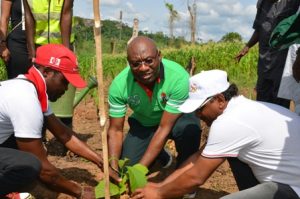Business
Heritage Bank: 9years of driving food sufficiency via bridging Agric value-chain finance gaps

Heritage Bank: 9years of driving food sufficiency via bridging Agric value-chain finance gaps
HERITAGE BANK– Nigeria’s agriculture sector over the years has experienced myriad of challenges ranging from sub-optimal yields, shrinking resources, post-harvest losses, fluctuating commodity prices and poor adaptation to changing climate systems, among others.
There are also problems at different stages of the value chain: scarcities in quality of inputs and varieties, inadequate funding, slow adoption of mechanisation, and a high reliance on subsistence production techniques which have hindered scaling, limited processing opportunities with direct impacts on output and value generation.
As the world population is projected to increase to 9.5billion by the year 2050, there is critical need to rev up food production and enhance value addition across the value chain segment of key agriculture food products, especially as the development of Agriculture continues to remain a critical issue for Nigeria’s economic growth, poverty reduction and in ensuring food security of the country, as over 70 percent of rural households depend on agriculture as their principal means of livelihood.
All of these have contributed to an underdeveloped commodity marketing system. The outbreak of COVID-19 added extra layers of challenges to the above-mentioned issues.
Measures put in place to manage the spread of the virus led to restrictions in the movement of people and goods, which in turn made access to critical inputs unavailable and increased costs in the few places where they were found.
These developments impacted smallholder farmers who make up the bulk of players in the industry across the country.
Given this development, many Nigerian financial institutions started investing in the agricultural sector. Heritage Bank is one of the banks that has taken pride in the past nine (9) years of its operations to bridge the agriculture value chain financing gaps.
Today marks its worthy milestone in the banking landscape, as Heritage Bank celebrates nine years of entrenching seamless service delivery in the business of banking, it has also remained resilient in hastening the transition of agriculture from traditional, low-productivity models toward a modern, high-productivity agricultural sector.
This has been made possible through its strategic collaboration with key stakeholders like the Central Bank of Nigeria (CBN) and Federal Government to prioritise the agricultural sector to attract sizable investments that has continued to help drive expansion and achieve competitiveness as well as increase financing to key parts of the value chain, particularly small-holder farmers in a bid to modernize their practices and increase outputs. Under the various intervention agricultural schemes: Anchor Borrowers Programme (ABP), the Nigeria Incentive-Based Risk Sharing System for Agricultural Lending (NIRSAL),
Commercial Agriculture Credit Scheme amongst others, Heritage Bank has made huge success of the schemes by making funding available to both small holder farmers and SMEs (Prime Anchors) in their efforts to increase agricultural output especially rice and wheat production.
Heritage Bank’s Exemplary Intervention
Heritage Bank Plc, by every instrument of measurement has distinctly and evidently made funds available to both individuals and corporate organisations in their efforts to increase agricultural output in line with governments policy and CBN intervention strategies.
The bank has palpably financed critical agricultural projects in the country and, in the process, supported many farmers.
Since the nine (9) eventful years, the bank has opened its doors to its teeming customers, the showpiece of its operations is a full gamut of completed, on-going and nascent people-oriented programmes designed to create, preserve and transfer wealth across generations in the country.
This line of operation is steadily yielding great results as the nation continues to move its economic base towards the direction of the future, with a robust emphasis on thoughts about diversification of the county’s economic base.
For some period of operation, Heritage Bank is being positioned into a bigger and stronger financial institution that is placed to play a significant role in the much-envisaged transformation of the nation’s financial sector in line with the country’s stature as one of Africa’s largest economies.
With the increasing recognition of agriculture as the ‘beautiful bride’ of Nigeria’s economy, Heritage Bank’s unfaltering energy and commitment in agricultural financing which is fast gaining new interests and more attention within the business circles is helping to rebalance the sector such that Nigeria would soon become the food basket of the African continent.
As agriculture continues to be business, financing provides tremendous opportunities for lenders and borrowers, either at small or large scale.
Heritage Bank has not only encouraged governments, corporate and individual (including young people to embrace optimal productivity and greatness in this sector), it has taken the front seat in the drive to support them in the attainment of noble agricultural virtues by funding various agricultural projects in several states in the country
Promoting Agriculture Value Chain
The Bank is also not relenting in its efforts at boosting the agricultural base of the nation by make farming profitable to stakeholders and attractive to the youth.
It has continued to create market linkages between smallholder farmers and Anchors/Processors, creating an ecosystem that drives value chain financing, improve access to credit by the smallholder farmers by developing credit history through the scheme and much more.
MD/CEO of Heritage Bank, Ifie Sekibo affirmed that the institution is committed to promoting development of agriculture and ensuring that all levels of its value chain can be financed profitably.
According to him, the bank’s involvement in the sector dated back to many years ago and it has always been at the forefront of ensuring overall growth and development of commodities products in Nigeria. For these feats, the CBN’s Governor, recently announced the apex bank’s N41billion intervention in wheat production in Nigeria for commodity associations and anchor companies. Heritage Bank has continued to work with CBN and other stakeholders such as wheat farmers association of Nigeria, wheat farmers, processors and marketers’ association of Nigeria, Lake Chad Research Institute and other development partners, flour mills of Nigeria and several seed companies and others to support over 100,000 farmers in wheat production. Also, Heritage Bank further factored consideration of value addition of financial services and products flowing to and/or through value chain participants to address and alleviate constraints to growth that have distorted product financing, receivables financing, physical-asset collateralization, risk mitigation products and financial enhancements.
According to sekibo, with its assigned position Heritage Bank would play a pivotal role in ensuring that there would be an effective and readily available platform for market linkages among players in the agribusiness value chain, involving FMCGs, warehouse operators, collateral managers, processors, farmers’ cooperatives to transact in a seamless way that guarantees quality, quantity, payment and delivery.
Partnerships As Growth Strategy
The Bank believes in teamwork and that is why partnership with various critical stakeholders and institutions remain a major pillar in its strategy to realise these objectives.
These partnership over the period brought about the support of small holders’ farmers and Anchors in Oyo, Ogun, Niger, kebbi, in various communities in Kaduna and Zamfara State in food crop cultivation, cash crop/horticulture, and food processing (in rice, maize, palm oil, casava etc) under NIRSAL and Prime ABP.
Meanwhile, in line with its collaborative initiative Heritage Bank Plc entered a partnership agreement with the Nigeria Incentive Based Risk Sharing System for Agricultural Lending in a bid to improve the agriculture value chain by increasing financing to the sector.
The partnership aims at identifying and securing financing of impactful agribusinesses within all the segments of the agricultural value chain.
The financing was designed to cover segments from primary production of raw materials and sustaining the processing industries to exportation of the produce.
Ifie Sekibo, the Managing Director of Heritage Bank, offered a wonderful explanation as to the reason for the partnership.
To him, the partnership will avail credits at very low interest rates to commercially viable agricultural projects that have been packaged and fully de-risked.
Before then arrangements have been concluded by the bank to revolutionise the agricultural sector by widening and deepening the participation of digital generation in agribusiness.
Sekibo was convinced that support of NIRSAL would help the bank develop a digital agribusiness platform that will strengthen distribution of human capital that meet parameters of agribusiness.
NIRSAL, agreed to serve as a catalyst for national agricultural revolution by boosting commercial agricultural productivity, competitiveness, value addition, market access and enhancing food security and will deploy a mechanism of de-risking the agricultural value chain in order to encourage investment by banks and the entire financial sector.
Divisional Head, Agribusiness, Natural Resources & Project Development, Heritage Bank, Olugbenga Awe said that the bank has strategically put in place measures to ensure fidelity to contract agreements and adherence to fair trade in making sure that farmers earned decent profit for their efforts, which is critical to the sustainability of the programmes.
According to him, “the bank’s participation in the programme has paid off as we currently have a rich pool of farmers’ data to support grains production. “The registered farmers in our database can easily be identified and trained with the support of extension services to plant any grains as the season demands. This flexibility provides continuous cash flows to the famers and ensures that more farmers are enlisted to join the programme,” he said.
The Divisional Head, further disclosed, “In our quest to participate in the rice value-chain through the ABP, we supported hundreds of small holder farmers in various communities in Kaduna and Zamfara State.”
“The sector is driving the next set of entrepreneurs and we are committed to the development of the sector using appropriate technology and modern farm practices. We walk the talk in Heritage Bank as demonstrated in our portfolio allocation to agribusiness,” he said. He noted that the large-scale operators are enabled to expand existing capacities and industrialise for local consumption and export.
This scheme, however, informed Heritage Bank partnership with the Oyo State government in a multi-billion-naira project to give agriculture a boost in the state.
Under the initiative, the bank is supporting the Oyo State Agricultural Initiative, OYSAI, a programme designed to revive agriculture, boost agro-allied businesses and create a massive empowerment programme for both youths and women across the state through the creation of thousands of jobs in the sector.
This huge and laudable project that is spread across 3,000 hectares of land in 28 of the 33 Local Government Areas of Oyo State, is in three stages: food crop cultivation, cash crop/horticulture, and food processing.
Poultry farming in Oyo State – N29million received from NIRSAL and disbursed to farmers Maize cultivation in Ogun State – N157million received from NIRSAL and disbursed to farmers for cassava cultivation in Kebbi State – Transaction size is about N500million approved by CBN.
Heritage Bank Plc signed a N232 million pilot phase of the out-growers agreement with Biase Plantations Limited (BPL), and its joint venture partner, PZ Wilmar Limited to produce best-in-class palm oil, using the ABP model.
Heritage Bank is supporting agro investors involved in this initiative with funds and advisory services and indications are that the programme has already led to more than 50 per cent increase in food production in the state.
Partnering the CBN
Heritage Bank’s partnership with CBN over the years has revolutionised the agricultural value-chain with consideration to value addition, marketing and other backward and forward linkages. Recently, the Bank in partnership with CBN set up plans in disbursing a whopping sum of N41billion to farmers from 14 states for the expansion of the wheat production project.
As part of bridging the Agric Value chain financing gap, the Bank, however, registered the wheat farmers with the Lagos Commodities and Futures Exchange (LCFE) for successful disbursement, as the farmers are expected to cover about 111, 025 Hectares of land to attain huge milestones in wheat production.
Meanwhile, being the pioneer Bank to finance the first-ever large scale rain-fed wheat production in Nigeria and also a participating financial institution (PFI) under CBN’s Anchor Borrowers’ Programme scheme, Heritage Bank has taken adequate steps to create an enabling environment for sustainable growth in wheat production; thereby partnering with LCFE for all value-chain stakeholders to interact and trade ownership titles to specific quantities of wheat by registering members for their clients on the commodity exchange platform. Speaking at the media briefing engagement with the pressmen, the MD/CEO of Heritage Bank, Ifie Sekibo stated that the partnership is basically to consummate Wheat Seed Multiplication Project under the CBN’s Brown Revolution Initiative, in order to ensure due diligence on loan administration, monitoring and recovery, which would bring about increase in the domestic production of wheat and close the wide supply gap in the Nigerian agricultural space.
Also, Awe explained that via the strategic partnerships Heritage Bank has achieved vast footprints in agribusiness.
“For example, through our partnership with Triton Aqua Africa Limited and on-lending support from CBN, Heritage Bank has provided N2 billion for aquaculture to reduce our heavy reliance on fish import.
“Nigeria’s current annual demand for fish is estimated at 2.7 million metric tonnes and we currently produce about 800,000 metric tonnes.
“With support from CBN through Commercial Agriculture Credit Scheme CACS, Triton is now producing about 27,000 metric tonnes and their projection is to reach 100,000 metric tonnes in five years.
“From recent forecast, they will meet that projection easily. The bank is also supporting rice farmers under the ABP in Bakolori, Zamfara, Sanga in Kaduna and Soyabeans farmers in Rijana, Kaduna. Heritage Bank also has ongoing projects across the country,” he said.
On Heritage Bank’s involvement in ABP, the Bank provides on-lending funding to aggregated farmers to grow various products that will serve as raw materials to the processors, thereby ensuring market linkages and access to the market as well as reduce importation and conserve Nigeria’s external reserves.
In 2016, the sums of N54,892,728.00 and N248,413,350.00 were sourced from CBN and disbursed as loans to 185 rice farmers and 414 soya bean farmers respectively in Kaduna State.
In 2016, N37, 995,300.00 was disbursed to 259 rice farmers via 11 cooperatives in Zamfara State.
This line of action has readily compelled young and vibrant minds into getting involved in providing affordable financial solutions that can help agribusiness investors in various aspects of agriculture.
Presently, the bank is practically involved in preparing a good future for the youth, which is imperative, while recognizing the need to expand the horizon of young people, broaden their options and increase their choices.
The institution realized that the youth are needed as solution providers, incubators of ideas, promoters of innovations and implementers of positive change through agriculture and entrepreneurship.
Recognitions
No doubt Heritage Bank’s unswerving lending to the agricultural sector has earned it a deluge of accolades.
To its portfolio Heritage Bank Plc, earned the Nigeria’s Most Innovative Banking Service Provider in 2017 that was bestowed at the inaugural Nigeria Sustainable Banking Award convened by the CBN “For Sustainable Transaction of The Year in Agriculture.”
The Nigeria Agriculture Awards (NAA), at its annual event convened by AgroNigeria (The Voice of Nigeria’s Agriculture), to appreciate immense efforts of those who have contributed to the success of the agriculture sector in the country, announced Heritage Bank as the Agric Bank of the Year.
According to NAA, Heritage Bank was selected in recognition of its footprints in the Agric space, especially the Triton Aquaculture Project. Heritage was adjudged best SME Bank for 2018 by Capital Finance International and Agriculture Bank of the Year 2018 by Nigeria Agriculture Awards, MAA.
The Bank also won “For Sustainable Transaction of The Year in Agriculture,” in the inaugural Nigeria Sustainable Banking Award convened by the Central Bank of Nigeria (CBN).
The financial institution was adjudged Banker of the Year 2021 under SMEs and Agric category, which was awarded to the MD/CEO of the Bank, Ifie Sekibo during the prestigious award at the New Telegraph 2021 Awards in recognition of its leadership position in delivering sterling development and growth of the agricultural sector and the Small and Medium Enterprises.
Also, Heritage Bank Plc which has been adjudged the lead settlement bank for Gezawa Commodity Market (GCMX), has collaborated with key stakeholders to revolutionise the agricultural value-chain.
The collaboration was aimed at providing a fully integrated ecosystem for commodity Exchange.
Heritage Bank was appointed the Lead Settlement Bank and Transaction Adviser to GCMX and a memorandum of understanding (MoU) was signed between the two firms, whilst over 10, 000 farmers in 3000 cooperatives in the 44 local governments of Kano States were hosted.
The partnership between Heritage Bank and the Exchange has continued to facilitate the ease of agro commodity trading in a more structured way, especially with the closeness to the Dawanu, the largest grain market in Africa.
Sekibo, who was a panelist at the second GCMX Farmers’ Cooperative Forum in Kano said the partnership was to de-risk the sector and bring about structured and enhanced agro-business and attain food security that leads to economic development.
Sekibo explained that the partnership which would help bridge the huge gap associated with risk, would fast track effective price discovery mechanisms and traceability and enhanced trade settlement services.
Specifically, he stated that under the Central Bank of Nigeria’s Anchor Borrowers Programme (ABP) and the Nigeria Incentive-Based Risk Sharing System for Agricultural Lending (NIRSAL), Heritage Bank would provide on-lending funding to aggregated farmers in the farming season to grow various products that will serve as raw materials to the processors, thereby ensuring market linkages and access to the market as well as reduce importation and conserve Nigeria’s external reserves.
Because the challenges are daunting, Heritage Bank Plc is also calling on governments at all levels and deposit money banks to increase support to agriculture, as it is the most resilient and important sector of the Nigerian economy, despite underwhelming investment in the sector.
The Bank believes that increased focus on the agricultural sector would contribute to the job creation objectives of the Economic Recovery and Growth Plan (ERGP), as its labour intensive process across the value chain has the potential of creating multiple jobs, create wealth, and increase the sector’s contribution to GDP and foreign exchange earnings
Heritage Bank observes that the under-performance of the sector is closely tied, amongst other factors, to poor credit access from banks.
The Bank also observes underfunding of Nigeria’s Agricultural research institutes that are established to drive the sector’s business.
It is in the Bank’s opinion that successful implementation of the Government’s Recovery Plan provides significant opportunities for entrepreneurs, investors and financiers particularly in the Agro-allied Sector.
Also, investments in infrastructure (energy and transportation) are supportive of the Agric-led growth and to explore options for de-risking and unlocking bank lending to the Agric sector so as to develop and position the sector for increased contribution to the Nigeria’s GDP and revenues, there is need to continue regulatory driven intervention funds to increase access to credit at single digit rates and long tenors, Improve knowledge of Banks and Bankers on Agric finance and Agricultural Risk Management through focused capacity building and many others, said the Bank in its submission for a better agriculture driven economy.
Business
Nigeria’s Inflation Drops to 15.10% as NBS Reports Deflationary Trend

Nigeria’s headline inflation rate declined to 15.10 per cent in January 2026, marking a significant drop from 27.61 per cent recorded in January 2025, according to the latest Consumer Price Index (CPI) report released by the National Bureau of Statistics.
The report also showed that month-on-month inflation recorded a deflationary trend of –2.88 per cent, representing a 3.42 percentage-point decrease compared to December 2025. Analysts say the development signals easing price pressures across key sectors of the economy.
Food inflation stood at 8.89 per cent year-on-year, down from 29.63 per cent in January 2025. On a month-on-month basis, food prices declined by 6.02 per cent, reflecting lower costs in several staple commodities.
The data suggests a sustained downward trajectory in inflation over the past 12 months, pointing to improving macroeconomic stability.
The administration of President Bola Ahmed Tinubu has consistently attributed recent economic adjustments to ongoing fiscal and monetary reforms aimed at stabilising prices, boosting agricultural output, and strengthening domestic supply chains.
Economic analysts note that while the latest figures indicate progress, sustaining the downward trend will depend on continued policy discipline, exchange rate stability, and improvements in food production and distribution.
The January report provides one of the clearest indications yet that inflationary pressures, which surged in early 2025, may be moderating.
Bank
Alpha Morgan to Host 19th Economic Review Webinar

Alpha Morgan to Host 19th Economic Review Webinar
In an economy shaped by constant shifts, the edge often belongs to those with the right information.
On Wednesday, February 25, 2026, Alpha Morgan Bank will host the 19th edition of its Economic Review Webinar, a high-level thought leadership session designed to equip businesses, investors, and individuals with timely financial and economic insight.
The session, which will hold live on Zoom at 10:00am WAT and will feature economist Bismarck Rewane, who will examine the key signals influencing Nigeria’s economic direction in 2026, including policy trends, market movements, and global developments shaping the local landscape.
With a consistent track record of delivering clarity in uncertain times, the Alpha Morgan Economic Review continues to provide practical context for decision-making in a dynamic environment.
Registration for the 19th Alpha Morgan Economic Review is free and can be completed via https://bit.ly/registeramerseries19
It is a bi-monthly platform that is open to the public and is held virtually.
Visit www.alphamorganbank to know more.
Business
GTBank Launches Quick Airtime Loan at 2.95%

GTBank Launches Quick Airtime Loan at 2.95%
Guaranty Trust Bank Ltd (GTBank), the flagship banking franchise of GTCO Plc, Africa’s leading financial services group, today announced the launch of Quick Airtime Loan, an innovative digital solution that gives customers instant access to airtime when they run out of call credit and have limited funds in their bank accounts, ensuring customers can stay connected when it matters most.
In today’s always-on world, running out of airtime is more than a minor inconvenience. It can mean missed opportunities, disrupted plans, and lost connections, often at the very moment when funds are tight, and options are limited. Quick Airtime Loan was created to solve this problem, offering customers instant access to airtime on credit, directly from their bank. With Quick Airtime Loan, eligible GTBank customers can access from ₦100 and up to ₦10,000 by dialing *737*90#. Available across all major mobile networks in Nigeria, the service will soon expand to include data loans, further strengthening its proposition as a reliable on-demand platform.
For years, the airtime credit market has been dominated by Telcos, where charges for this service are at 15%. GTBank is now changing the narrative by offering a customer-centric, bank-led digital alternative priced at 2.95%. Built on transparency, convenience and affordability, Quick Airtime Loan has the potential to broaden access to airtime, deliver meaningful cost savings for millions of Nigerians, and redefine how financial services show up in everyday life, not just in banking moments.
Commenting on the product launch, Miriam Olusanya, Managing Director of Guaranty Trust Bank Ltd, said: “Quick Airtime Loan reflects GTBank’s continued focus on delivering digital solutions that are relevant, accessible, and built around real customer needs. The solution underscores the power of a connected financial ecosystem, combining GTBank’s digital reach and lending expertise with the capabilities of HabariPay to deliver a smooth, end-to-end experience. By leveraging unique strengths across the Group, we are able to accelerate innovation, strengthen execution, and deliver a more integrated customer experience across all our service channels.”
Importantly, Quick Airtime Loan highlights GTCO’s evolution as a fully diversified financial services group. Leveraging HabariPay’s Squad, the solution reinforces the Group’s ecosystem proposition by bringing together banking, payment technology, and digital channels to deliver intuitive, one-stop experiences for customers.
With this new product launch, Guaranty Trust Bank is extending its legacy of pioneering digital-first solutions that have redefined customer access to financial services across the industry, building on the proven strength of its widely adopted QuickCredit offering and the convenience of the Bank’s iconic *737# USSD Banking platform.
About Guaranty Trust Bank
Guaranty Trust Bank (GTBank) is the flagship banking franchise of GTCO Plc, a leading financial services group with a strong presence across Africa and the United Kingdom. The Bank is widely recognized for its leadership in digital banking, customer experience, and innovative financial solutions that deliver value to individuals, businesses, and communities.
About HabariPay
HabariPay is the payments fintech subsidiary of GTCO Plc, focused on enabling fast, secure, and accessible digital payments for individuals and businesses. By integrating payments and digital technology, HabariPay supports innovative services that make everyday financial interactions simpler and more seamless.
Enquiries:
GTCO
Group Corporate Communication
[email protected]
+234-1-2715227
www.gtcoplc.com
-

 celebrity radar - gossips6 months ago
celebrity radar - gossips6 months agoWhy Babangida’s Hilltop Home Became Nigeria’s Political “Mecca”
-

 society6 months ago
society6 months agoPower is a Loan, Not a Possession: The Sacred Duty of Planting People
-

 society5 months ago
society5 months agoReligion: Africa’s Oldest Weapon of Enslavement and the Forgotten Truth
-

 news6 months ago
news6 months agoTHE APPOINTMENT OF WASIU AYINDE BY THE FEDERAL GOVERNMENT AS AN AMBASSADOR SOUNDS EMBARRASSING











